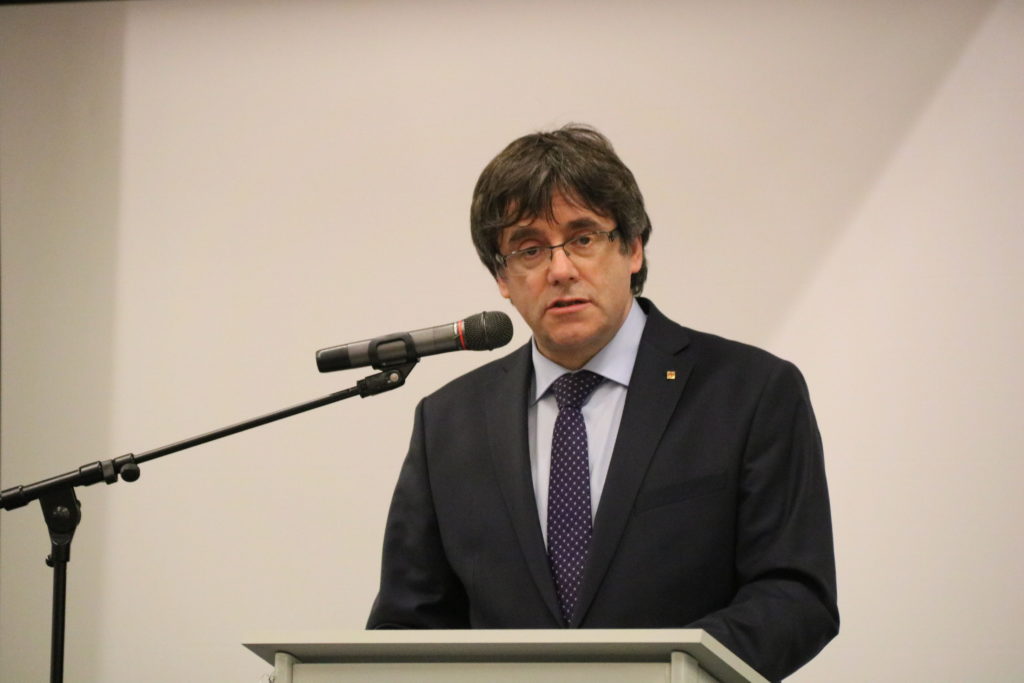02.03.2018 - 12:53
|
Actualització: 05.03.2018 - 13:40
As Carles Puigdemont’s bid to reclaim the presidency of Catalonia ceases for a time, his challenge against the Spanish government has not stopped—if anything, it has accelerated. His legal team has lodged a formal complaint with the United Nations Human Rights Committee over Spain’s crackdown on Catalonia’s push for independence.
“Puigdemont alleges that Spain is guilty of violating its international treaty obligations through the cumulative imposition of disproportionate and unjustified restrictions with the exercise of his political rights,” reads the summary of Puigdemont’s complaint, which invokes the Universal Declaration of Human Rights and the International Covenant on Civil and Political Rights (ICCPR).
Puigdemont was deposed by the Spanish government last October after declaring the independence of Catalonia, and faces criminal charges of rebellion, sedition and misuse of public funds. He ran in a subsequent election from Belgium, where he is currently seeking refuge from Spanish justice, and became the most voted candidate among the pro-independence parties. Yet, Spain’s Constitutional Court made it clear that he could only retake his post if he returned to the country and faced arrest.
Legitimate president
“I will not give up in the face of the illegitimate behaviour of those who lost at the ballot box,” he said in a video appearance on Thursday, shared via Twitter after the Catalan parliament voted on a resolution symbolically recognizing him as the legitimate president.
In the announcement of his “temporary” withdrawal, Puigdemont proposed Jordi Sànchez as his successor, a pro-independence activist held in a Madrid prison since October 16. In all, 28 Catalan leaders are under investigation for their role in the independence bid, and 12 people have been held behind bars at some point in the past few months.
“Even though he has never been convicted of a crime or stripped of his political rights in a court of law,” reads the appeal, “Mr Puigdemont’s rights to political participation, political expression and political association have been ruptured and ultimately snuffed out, at least for an indeterminate period, in pursuit of Spain’s broad political objection to independence from Catalonia, and in order to stifle political opposition and the expression of dissent.”
Pressure on Spanish government
The British lawyer Ben Emmerson, who joined the defense team of pro-independence leaders a month ago, stressed in a press conference on Friday that they will to continue to make applications to the international community and its mechanisms of judicial enforcement “every month” until the Spanish government “is driven to the negotiation table.”
On February 1, Emmerson announced that three Catalan leaders currently in jail—Oriol Junqueras, Jordi Sànchez and Jordi Cuixart—would bring their cases to the UN’s Working Group on Arbitrary Detention.
“Spain seems to think that this is a piece of paper that they can discard at will. Or at least the [Spanish president Mariano] Rajoy government seems to regard its international obligations as being a joke,” said Emmerson on Friday. “But let me assure you, and let me assure him, that they will in due course be vindicated, these rights are central to political democracy.”
Emmerson is a lawyer specializing in human rights and international criminal law. Throughout his career, he has appeared before the European Court of Human Rights in Strasbourg, the International Criminal Court in the Hague and the United Nations International Criminal Tribunal for the former Yugoslavia.
The UN’s Human Rights Committee is a body of independent experts that monitors implementation of the ICCPR by the states who are party to it, which are obliged to submit regular reports on how the rights are being implemented. The Committee examines each report and addresses its concerns and recommendations to each state in the form of concluding observations.



